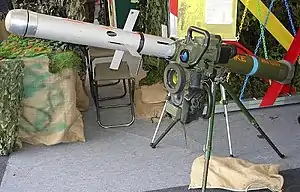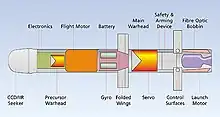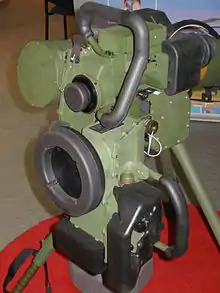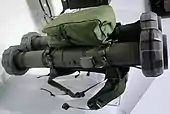Spike (missile)
Spike (Hebrew: ספייק) is an Israeli fire-and-forget anti-tank guided missile and anti-personnel missile with a tandem-charge high-explosive anti-tank (HEAT) warhead. As of 2007, it is in its fourth generation.[5] It was developed and designed by the Israeli company Rafael Advanced Defense Systems. It is available in man-portable, vehicle-launched, and helicopter-launched variants.
| Spike | |
|---|---|
 Spike ATGM Command & launcher unit (CLU) with mock-up Spike-LR missile mounted on a tripod at Singapore Army Open House 2007 | |
| Type | Anti-tank guided missile |
| Place of origin | Israel |
| Service history | |
| In service |
|
| Used by | See Operators (41 countries ordered it[1]) |
| Wars | |
| Production history | |
| Designer | Rafael Advanced Defense Systems |
| Designed | Late 1970s (Spike NLOS) |
| Manufacturer | Rafael Advanced Defense Systems & EUROSPIKE GmbH
|
| Unit cost | $210,000 Spike NLOS[2] |
| Produced |
|
| No. built | 40,000 (2023)[3] and 7,000 fired |
| Variants | See variants |
| Specifications | |
| Mass | Spike-ER from helicopter:
Spike-MR/LR from ground:[4]
Spike-SR: |
| Length |
|
| Diameter |
|
| Rate of fire | Ready to launch in 30 seconds, reload in 15 seconds |
| Effective firing range | |
| Sights | 10× optical sight |
| Warhead | Tandem-charge HEAT warhead |
Detonation mechanism | Piezoelectric trigger |
| Engine | Solid-propellant rocket |
Guidance system | Infrared homing – Electro-optical (CCD, imaging infrared (IIR), or dual CCD/IIR), passive CCD, or dual CCD/IIR seeker |
The missile can engage and destroy targets within the line-of-sight of the launcher ("fire-and-forget"), and some variants can make a top attack through a "fire, observe and update" method (essentially lock-on after launch);[5] the operator tracking the target, or switching to another target, optically through the trailing fiber-optic wire (or RF link in the case of the vehicle-mounted, long-range NLOS variant) while the missile is climbing to altitude after launch. This is similar to the lofted trajectory flight profile of the US FGM-148 Javelin.
Design


Spike is a fire-and-forget missile with lock-on before launch and automatic self-guidance. The missile is equipped with an imaging infrared seeker.
The long and extended range versions of the Spike also have the capability of "Fire, Observe and Update" operating mode (also known as Lock-on after launch (LOAL)). The missile is connected by a fiber-optical wire that is spooled out between the launch position and the missile. With this, the operator can obtain a target if it is not in the line of sight of the operator at launch, switch targets in flight, or compensate for the movement of the target if the missile is not tracking the target for some reason. Hence, the missile can be fired speculatively for a target of opportunity, or to provide observation on the other side of an obstacle. The missile has a soft launch capability – the motor firing after the missile has left the launcher – that allows the missile to be fired from confined spaces, which is a necessity in urban warfare.
The missile uses a tandem warhead consisting of two shaped charges: a precursor warhead to detonate any explosive reactive armor, and a primary warhead to penetrate the underlying armor. Currently, it is replacing aging semi-automatic command to line of sight second generation anti-tank missiles like the MILAN and M47 Dragon in the armies of the user nations. Spike missile is also equipped with heat chasing technology.
The Spike system is made up of the launching tripod with its fire control unit and the missile. There is no dedicated thermal sight on the launcher: the missile's imaging seeker is used. Altogether, the long range variant of the system weighs around 26 kg (57 lb).
Spike can be operated from the launcher by infantry, or from mounts that can be fitted to vehicles such as fast attack vehicles, armoured personnel carriers or utility vehicles. Vehicles that are not normally fitted with anti-tank weapons can therefore be given anti-tank capability.
Spike has been tested as a weapon system for the SAGEM Sperwer unmanned aerial vehicle. The Spanish Army has fitted the Spike-ER to its Eurocopter Tiger attack helicopters.[6][7] Both Israel and the United States have experimented with arming Sikorsky UH-60 Black Hawk helicopters with the Spike missile; the US variant is used in UH-60M Battlehawk helicopters.[8]
Marketing
In order to facilitate the selling of the weapon system in Europe, the company EuroSpike GmbH was formed in Germany. Its shareholders are Diehl Defence (40%), Rheinmetall Defence Electronics (40%) and Rafael via ERCAS B.V (20%). ERCAS B.V. is a Dutch holding company owned 100% by Rafael.
EuroSpike GmbH is located in Röthenbach, Germany. The European variant of the Spike weapon system differs a little from the Israeli version and is marketed under the name EuroSpike.[9]
The missiles were also marketed and produced under license in Singapore by ST Engineering.[10]
For other areas of the world, Rafael Advanced Defense Systems Ltd. is solely responsible.[11]
Variants
The reusable Command & launch unit (CLU), battery, tripod and the thermal sight are common for both MR and LR versions of the Spike missile family, each weighing 5 kg (11 lb), 1 kg (2.2 lb), 2.8 kg (6.2 lb), and 4 kg (8.8 lb) respectively.[4]
Spike-SR
The short range version of the weapon was unveiled in 2012 to give infantrymen a guided missile between the larger Spike-MR and unguided rockets.[12] The missile is 8 kg (18 lb) for a 9.8 kg (22 lb) disposable munition for use at platoon-level whose minimum range is 50 m (160 ft) and whose maximum range is 1.5 km (0.93 mi). It is equipped with a stiff-necked uncooled electro-optical infrared seeker and advanced tracker, as opposed to the gimballed seeker in the Spike MR/LR/ER versions.[13] The Spike-SR does not require a separate sight, instead utilizing the low-cost thermal camera and guidance electronics strapped to the missile's nose to provide this function through a display integrated into the launcher, showing the target until launch.[14] The warhead can either be a multi-purpose tandem shaped-charge warhead with blast-fragmentation effect[12] or a new Penetration-Blast-Fragmentation (PBF) variant leveraged from the MATADOR's anti-structure warhead to equip maneuvering forces in urban environments to breach enemy cover and structures with a lethal blast effect.[13] In May 2016 Rafael concluded deliveries of Spike-SR to its first export customer,[15] later revealed to be the Singapore Armed Forces to replace the Carl Gustaf M2.[16]

Spike-MR
The medium range version (Israeli designation: NT-Gil). The weight of the missile is 14 kg (31 lb), its minimum range is 200 m, while its maximum range is 2,500 m (1.6 mi). It is used by infantry and special forces.[17]
Spike-LR
Long range version (Israeli designation: NT-Spike). The weight of the missile is 14 kg (31 lb), and the weight of the complete system is less than 45 kg (99 lb).[18] Maximum range is 4,000 m (2.5 mi) and it is used by infantry and light combat vehicles. It adds fiber-optic communication to and from the operator during flight.[19] Reported armour penetration capability is more than 700 mm (28 in) of Rolled homogeneous armour (RHA).[20] It is also deployed in Sentry Tech remotely controlled weapons stations along the Gaza border.[21] In early 2014, Rafael revealed they had increased the range of the Spike-LR to 5 km (3.1 mi), enhancing versatility on existing firing platforms and allowing it to be utilized on new ones like light helicopters.[22]
Spike-LR II

A new generation of the original Spike-LR is in full-scale development and scheduled to be operational by the end of 2018. Spike-LR II (Israeli designation: Gil-2, גיל 2) has reduced weight to 12.7 kg (28 lb), increased range of 5.5 km (3.4 mi) at ground level and 10 km (6.2 mi) from helicopters using an RF data-link, warhead options of tandem HEAT with 30% increased armor penetration or a multipurpose blast warhead with selectable impact or penetration detonation fusing, a new seeker that includes an uncooled IR sensor with a smart target tracker with artificial intelligence features, the ability to fire on grid target coordinates using an inertial measurement unit for third party-target allocation, and is compatible with legacy launchers. The missile is designed with a counter-active protection system (CAPS) capability, being able to hit targets at higher impact angles of up to 70 degrees.[23][24] First ordered by the Israel Defense Forces (IDF) in October 2017.[25]
Spike-ER
Extended range or extra-long range version of the weapon (Israeli designation: NT-Dandy or NT-D). It has a minimum range of 400 m and a maximum range of 8,000 m (5.0 mi).[26] It has a larger diameter and is heavier than the other systems, and is usually vehicle mounted. It is used by infantry, Light Combat Vehicle (LCVs), and helicopters. The Finnish Navy's Coastal Jaegers and Philippine Navy's Multi-purpose Attack Craft Mk.III also operate this version in the anti-ship role. The weight of the missile is 34 kg (74 lb 15 oz), the launchers are 30 kg (66 lb) and 55 kg (121 lb) respectively for the vehicle and air-launched versions. Penetration is around 1,000 mm (39 in) of RHA.[20]
Spike-ER II
In August 2018, Rafael disclosed the development of an enhancement of the missile called the Spike-ER II. It retains the same weight, airframe, surface geometries, and propulsion unit but introduces a two-way RF data-link to increase real-time control to an extended range of 16 km (9.9 mi) from helicopters; it also has an extended fiber optic link to increase range to 10 km (6.2 mi) from land and naval platforms.[27]
Spike NLOS
"Non Line Of Sight" is an ultra long-range version of the weapon (Israeli designation: Tamuz, תמוז), with a claimed maximum range of 25 km (16 mi). It is a significantly larger missile than other Spike variants, with an overall weight of around 70 kg (150 lb). It can be launched from the ground or from helicopters. It was developed following lessons learned in the Yom Kippur War, which showed a need for a high-precision guided tactical ground-to-ground battlefield missile. The first variants entered service with the Israel Defense Forces (IDF) in tandem with the Pereh missile carrier in 1981, though the existence of both was not revealed to the public until 2011.[28][29][30] The Spike NLOS uses a fiber optic link similar to other Spike versions, but only out to 8 km, after which it employs a radio data link for command guidance.[31]
In 2011 it also became known that in a highly unusual move, the British Army was hastily equipped with the missile for counter-mortar fire, drawn directly from IDF inventory after being exposed to increasing insurgent attacks in Iraq, beginning in 2007 three variants of the NLOS were procured. A total of 600 missiles were acquired, the breakdown being 200 optical camera equipped NLOS MK.2 in 2007, 200 thermal imaging equipped NLOS MK.4 in 2008 for night operations (together with the MK.2 these were known as EXACTOR-1), 200 dual camera equipped NLOS MK.5 (EXACTOR-2) followed in 2009 which featured wings for slower but better maneuvering flight and a multi-purpose warhead replacing the anti-armor warhead of previous versions.[32] For operational security, the codename of 'EXACTOR missile' was assigned in British service and it was initially mounted on launchers atop leased M113 APCs. The MK.2 performed badly being too fast and difficult to control, the M113 overheated in the desert and had a poor resolution camera display that compared unfavorably with its contemporaries.[33] So Britain financed the development of the Mk. 5 known in British service as the EXACTOR 2 which replaced the M113 APC with a towed trailer known as SPARC holding four missiles in a 360-degree rotating turret that could be remotely controlled up to 500m away[34] ditching the non-standard M113 APCs altogether when in 2010 the batteries were transferred from Iraq to Afghanistan.[35][36]
In a deal concluded on 6 September 2011, the South Korean government had agreed to purchase an unknown number of Mk. 5 Spike NLOS missiles.[37][38]
Rafael is working on expanding the missile's versatility by enhancing the existing EO-IR/CCD seeker with semi-active laser (SAL) capability and different anti-armor, blast-penetration, and high-explosive fragmentation warheads to meet specific applications.[22]
In 2020 the US Army announced its intention to procure Spike NLOS missiles to be mounted on Apache helicopters.[39] A test was conducted in March 2021 where an AH-64E fired a Spike NLOS at a target 32 km (20 mi) away and scored a direct hit.[40]
In June 2022, Rafael unveiled the Spike NLOS 6th generation with range increased to 50 kilometres (31 mi), a salvo feature which can launch up to four missiles at a time, and the ability to hand over control after firing to another platform. It also has a Target Image Acquisition capability that can prioritize important targets for strike, and can be carried by strategic UAVs in the Heron-TP-class.[41][42]
Mini-Spike
On 2 September 2009, at an IDF exhibition held at the third Latrun annual land warfare conference, the Israeli Defense Force unveiled a new member of the Spike family of missiles – the Mini Spike Anti-personnel guided weapon (APGW).[43][44] Rafael claimed that this latest member of the Spike family of missile costs and weighed only a third of the Spike-LR at 4 kg (8.8 lb), while offering a longer engagement range of 1.3–1.5 km (0.81–0.93 mi) when compared to the Spike-SR. It was to introduce new flight modes to enable precision strikes in urban areas, such as flying through windows or attacking an enemy hidden behind defilade or obstacles using non-line-of-sight engagement. Mini Spike would use the same launcher and sight system of the Spike-LR, loading the missile on a special adaptor.[14][45] By 2016, Mini-Spike development had been discontinued.[13]
Almas
Iran received Israeli Spike-MRs captured during the 2006 Lebanon War by Hezbollah fighters.[46] An unlicensed variant that goes by the name of Almas (Persian: الماس).[47] The ATGM was unveiled in public on July 7, 2021.[47]
Aerospike
In May 2022, Rafael unveiled the Aerospike, a version of the Spike-LR II designed to be launched from fixed-wing aircraft. Weighing 14 kg and utilizing the same airframe, EO/IR seekers and warheads as the Spike-LR II, it features longer wings to give it an improved glide ratio for a range of 30 km (19 mi) when launched from 8,200 metres (27,000 ft). The munition does not require GPS to navigate, incorporating scene-matching technology and detection and tracking capabilities. A real-time RF data-link allows for man-in-the-loop operation enabling mid-flight target handover, re-targeting and abort options while also controlling approach angle, azimuth and flight trajectory, achieving accuracy within 3 meters of the target with a HEAT or blast fragmentation warhead. By the time of public announcement, the Aerospike was already in service with unnamed users.[48][49][50]
Operators

.svg.png.webp) Australia
Australia- Spike-LR II selected by the Australian Army in 2018 [51][32]
- LAND 159, for dismounted infantry
- LAND 400-2, equipping the 211 Boxer CRV with LANCE turret
- LAND 400-3, equipping the 129 K21 Redback
 Azerbaijan
Azerbaijan- Total 350 Spike-LR and 250 Spike-NLOS missiles, some of which are mounted on the Plasan Sand Cat,[32] and Mil Mi-17.[52]
 Chile
Chile- Total 2,200 Spike-MR/LR/ER missiles, for use on modernised Marder IFVs.[32]
 Colombia
Colombia- Total 85 Spike-LR/ER and 110 Spike-NLOS missiles.[32] The Colombian Air Force's fleet of Sikorsky AH-60L Arpía IV[56]-series helicopters are armed with three variants of the Spike: the ER, LR and NLOS.[57]
 Croatia
Croatia- Croatia has ordered 20 Spike LRII launchers for its Patria AMV armored vehicles. However this is initial order, talks of 72 additional launchers for 27 brand new Patria IFVs that are on order and to join Croatian Army from 2023 to 2026. Croatia ordered 200 Spike LR2 missiles initially for $1.25 million.[58][59] Croatia made further order for Spike LR II missiles and plans to order further 72 Spike LR launchers as part of new Patria order. No indication of how many additional Spike LR II missiles Croatia intends to purchase, but Croatian defence minister stated that it'll be ongoing and recurring order as Army spends older missiles during exercises, stated requirements are for at least 576 missiles, it is estimated Croatian Army currently has around 200 missiles in its inventory. Spike SR/MR Missiles are being ruled out as Croatian army opted for Javelin missile to equip its infantry formations.[60][61]
 Czech Republic
Czech Republic- Total 500 Spike-LR missiles, for use on KBVP IFVs.[32]
 Denmark
Denmark- Spike-LR II To be integrated in the Royal Danish Army from 2021 to 2025. Will be used by infantry and from Protector Remote Weapon Station.[62][63]
 Estonia
Estonia- 18 Spike-LR II launchers bought from EuroSpike GmbH. More than 500 Spike-SR systems purchased in 2022.[65][66][67]
 Finland
Finland- Total 900 missiles, breakdown being 300 Spike-MR, 200 Spike-LR with the remaining 400 being Spike-ER.[32] 100 MR (Panssarintorjuntaohjusjärjestelmä 2000) launchers plus an option for 70 more, and 18 ER (Rannikko-ohjus 2006) launchers for coastal anti-ship use.[68] Also Spike-LR missiles as a newer purchase.[69] In December 2022 Finland ordered additional Spike SR, LR2 and ER2 missiles for 223.6 MEUR.[70]
 Germany
Germany- As of August 2023, the Bundeswehr ordered 4426 Spike-LR, 179 launcher units for the infantry, and the launchers for the 350 Puma.
- 2008, contract with EuroSpike to integrate the Spike-LR MELLS to the Puma IFV
- 2009, framework agreement for 311 ICLU with Rafael and Eurospike as the Spike is also selected to be used by Infantry detached personal, special forces and to be mounted on a tripod temporarily on the Puma IFV until its full system integration (€35 million) [71]
- December 2011, 1,160 MELLS missiles ordered (€119.3 million) [72]
- March 2017, €158.4 million order which includes [72]
- 1,000 MELLS missiles (€112.4 million)
- 97 launcher units (€25.6 million, 214 ICLU remaining from the initial framework agreement)
- Integration to Bundeswehr's laser based training and simulation system AGDUS (€20.3 million)
- November 2019, framework agreement with EuroSpike GmbH for 11,500 missiles, 214 launcher units, storage containers. Out of the agreement, the orders include:
 Greece
Greece- In April 2023, Greece ordered 17 Spike-NLOS systems on 4x4 vehicles, plus more on 9 AH-64 Apache helicopters and 4 Machitis-class gunboats.[75][76]
 Hungary
Hungary- Spike-LR II for Lynx armoured fighting vehicles.[77]
 India
India- Defense News reported that the Indian Army wanted to order Spike missiles and peripheral equipment in a $1 billion deal. Indian Ministry of Defence officials told the magazine that the order is for 321 launchers, 8,356 missiles, 15 training simulators, and peripheral equipment.[78][79][80] In October 2014, India chose to buy the Spike over the U.S. Javelin.[81] India's state-owned Bharat Dynamics Limited will be the systems integrator for the missiles with major work share for manufacture to be handled by Bharat Dynamics and Kalyani Group.[82] On 20 November 2017, it was announced that the deal was cancelled due to lack of transfer of technology. The DRDO has been instructed to produce an indigenous missile.[83][84][85] However, Indian media sources have reported that the contract will proceed as part of a restructured government to government agreement.[86] In April 2019, following the 2019 border skirmishes with Pakistan, the Indian Army approved an emergency purchase of 240 Spike MR missiles and 12 launchers to meet immediate requirements,[87] which were inducted into service in early October 2019.[88]
 Iran
Iran- Unlicensed clone as Almas. Reverse engineered Spike-MR with modifications. Originally captured by Hezbollah during the 2006 Lebanon War and given to Iran.
 Israel
Israel- The Spike NLOS (Tammuz) was introduced into service in the early 1980s.
- In 1997, the Spike MR (Gil), LR (Gomed), ER (Perakh Bar) with associated launchers entered service.[29]

 Italy
Italy- Total 1,490 Spike-LR and 750 Spike-ER missiles (with associated launchers and training systems), Spike-LR are for use on Dardo IFV, Freccia IFV and VTLM Lince while Spike-ER are for use by AH-129 Mangusta attack helicopters.[32] In July 2023, a contract for €143 million running from 2023 to 2030 was passed to supply Spike LR2 to the Italian Army and the Navy.[89]
 Lithuania
Lithuania- Total 1,000 Spike-LR missiles delivered, for use on Boxer armored vehicles.[32][95][96]
 Netherlands
Netherlands- Total 2,400+ Spike-MR missiles (including 297 launchers and associated training systems) ordered in 2001, deliveries began in 2006 and was completed by 2011.[32] A total of 237 launchers and 1,974 missiles was assigned to the Royal Netherlands Army, while the remaining 60 launchers and 459 missiles was assigned to the Royal Netherlands Marine Corps.[97] The first weapon was actually issued in 2004 to the Regiment van Heutsz.[98]
 Philippines
Philippines- The Philippine Navy operates the missiles. Spike-ER variant for the missile-capable versions of its Multipurpose Assault Crafts.[99] Spike-NLOS are for the Navy's AW159 Wildcat helicopters[100] and upcoming Acero-class fast attack interdiction crafts.[101]
 Poland
Poland- A total of 2,675 Spike-LR missiles (with 264 launchers and training systems) were ordered in 2003 in a deal worth $425 million with deliveries completed by 2013.[32] A follow-up order of 800 more Spike-LR missiles for use on Rosomak IFVs, in a deal including local production in Poland, was placed in 2015 with deliveries between 2019 and 2022.[32]
 Romania
Romania- Total 3,000 missiles; breakdown being 2,000 Spike-LR (for use on MLI-84M IFVs) with the remaining 1,000 being Spike-ER (for use on IAR 330 SOCAT attack helicopters).[32] An unspecified number of portable Spike-LR are also in service.[102]

 Singapore
Singapore- In 1999, Singapore became the second country to acquire the Spike ATGM.[103] Total 1,500 Spike-LR missiles (with associated launchers and training systems) received between 2001 and 2006.[32] Between 2017 and 2018, another 500 Spike-SR was received as the new generation anti-tank guided missile for its infantry battalions.[104][105] Spikes variants are produced locally by ST Engineering. The Hunter AFV of the Singapore Army is equipped with a twin tube pop-up launcher. There has been further orders for the Spike-LR II for use on the Hunter AFV and infantry units.
 Slovenia
Slovenia- Spike-MR/LR has been in operational use in the Slovenian Armed Forces since 2009.[108] Total 75 missiles. Some will be on Patria AMVs. In September 2022, EuroSpike was awarded a $6.6 million contract to supply 50 Spike LR2s.[109]
.svg.png.webp) Switzerland
Switzerland- The Swiss Armed Forces selected the Spike LR-II as its long-range anti-tank guided missile system for ground troops in 2023. It will replace the TOW ATGM.[110]
 Thailand
Thailand- Under a deal reached in 2020, the Royal Thai Army took delivery of the Spike-MR missiles and launchers.[111] Spike-MR was a contender along with Javelin.[112]
 South Korea
South Korea- A South Korean government deal concluded on 6 September 2011 confirmed the procurement of unspecified numbers of Spike NLOS, of which about 50 missiles will be forward deployed to the South Korean islands of Baengnyeongdo and Yeonpyeongdo, close to the Northern Limit Line with North Korea.[37][38] On 19 May 2013 the South Korean military confirmed that "dozens" of Spike missiles had been deployed on the islands.[113] The Republic of Korea Navy will also deploy the Spike NLOS on AgustaWestland AW159 Wildcat helicopters,[114] and the Republic of Korea Marine Corps has the Spike NLOS mounted on Plasan Sand Cat light vehicle.[115]
.jpg.webp)
 Spain
Spain- Total 2,630 Spike-LR (including 260 launchers and associated training systems) and 200 Spike-ER missiles (for use by Eurocopter Tiger attack helicopters).[32] A total of 236 launchers and 2,360 Spike-LR missiles was assigned to the Spanish Army, while the remaining 24 launchers and 240 missiles was assigned to the Spanish Marines.[68]
 United Kingdom
United Kingdom- 600 Spike-NLOS missiles were procured by the British Army, the exact breakdown being 200 NLOS MK.2, 200 NLOS MK.4 and 200 NLOS MK.5 ordered in the years 2007, 2008 and 2009, respectively. In British service it has the name 'Exactor'.[32][35][36][68][116]
 United States
United States- The Spike was offered by Rafael Advanced Defense Systems as a possible contender in the US Army JAWS missile program in 1996.[117] In January 2020, the Army revealed it would field the Spike NLOS on AH-64 Apache helicopters as an interim solution to acquire a longer range stand-off weapon.[118]
Evaluations
 Turkey
Turkey- In January 1998, a partnership arrangement was announced between Israel Aerospace Industries and Kamov to market the Kamov Ka-50-2 attack helicopter in Turkish competition. One of the optional armaments being offered for the Ka-50-2 was the Spike-ER missile.[117] Eventually, Ka-50-2 lost to TAI/AgustaWestland T129 ATAK. Turkey has also examined the use of Rafael Overhead Weapon Station with Spike for its Otokar Cobra light armored vehicles.[117]
 United Kingdom
United Kingdom- In February 2001, the British MoD awarded two contracts valued at $8.8 million for a year-long assessment of the Javelin and Spike-MR. The Spike was being offered by Rafael Advanced Defense Systems teamed with Matra BAe Dynamics, while the Javelin was being offered by a team of Lockheed Martin and Raytheon. The UK would like to field a lightweight antitank missile system for its Joint Rapid Reaction Force by 2005. In February 2003, the British MoD selected the Javelin.[117]
Failed bids
 Portugal
Portugal- A total of 2 Spike LR launchers would be fitted on Portuguese Marine Corps Pandur II IFV APC's, but the program was cancelled due to problems between the Portuguese government, Steyr-Daimler-Puch and Fabrequipa (local Pandur II manufacturer).[32][119][120]
References
- "Rafael wins naval maintenance and anti-tank missile deals". GLOBES. 13 August 2023. Retrieved 14 August 2023.
- "Missile Procurement, Army (FY2021)" (PDF).
- "Rafael wins naval maintenance and anti-tank missile deals". GLOBES. 13 August 2023. Retrieved 14 August 2023.
- "A multitude of launchers – for a multitude of use". EuroSpike GmbH. Archived from the original on 10 July 2011. Retrieved 29 June 2010.
- "Defense Update issue 2-07 (May – June 2007): Electro-Optically Guided Weapons". Defense-Update.Com. Archived from the original on 6 January 2010. Retrieved 1 July 2010.
- "Eurocopter Fires Spike Missile From HAD Tiger". Spacewar.com. Archived from the original on 14 May 2010. Retrieved 24 May 2010.
- "Tiger HAD Enters Firing Campaign Using the Spike Missile". Deagel.com. 12 September 2008. Archived from the original on 17 October 2010. Retrieved 24 May 2010.
- "UAE Seeks Weaponized UH-60M 'Battlehawk' Helicopters". Archived from the original on 21 September 2008. Retrieved 28 January 2012.
- "EuroSpike GmbH". EuroSpike GmbH. Archived from the original on 20 December 2010. Retrieved 1 July 2010.
- Yeo, Mike (28 July 2020). "Singapore, Israeli firms team to develop new ship-killing missile". Defense News. Retrieved 8 May 2022.
- "Multi-Purpose Missiles". Rafael Advanced Defense Systems Ltd. Archived from the original on 4 September 2011. Retrieved 26 August 2011.
- Rafael Unveils a Light, Affordable Member of the Spike Missile Family Archived 11 March 2016 at the Wayback Machine - Defense-Update.com, 14 February 2012
- Hughes, Robin (12 May 2016). "Rafael unveils Spike SR PBF warhead variant | IHS Jane's 360". Janes.com. Archived from the original on 13 May 2016. Retrieved 24 March 2017.
- Enhancing The New Spike Family Archived 25 August 2016 at the Wayback Machine - Defense-Update.com, 31 December 2010
- Rafael Concludes First Exports of Shoulder-Fired Anti-Tank Missile, Defensenews.com, 14 June 2016
- "Singapore Army acquires Rafael Spike SR anti-armour missile system | Jane's 360". www.janes.com. Archived from the original on 1 December 2017. Retrieved 28 November 2017.
- "Spike Medium Range (MR) – "Fire & Forget" for visible targets". EuroSpike GmbH. Archived from the original on 7 December 2009. Retrieved 29 June 2010.
- "Rheinmetall Defence - 26.06.2009: Rheinmetall – Auftrag im MELLS-Programm im Wert von 35 MioEuro". Archived from the original on 28 November 2010. Retrieved 18 August 2012.
- "Spike Long Range (LR) – "Fire & Forget" or "Fire Observe & Update" for different targets". EuroSpike GmbH. Archived from the original on 7 December 2009. Retrieved 29 June 2010.
- "Archived copy" (PDF). Archived from the original (PDF) on 16 November 2008. Retrieved 14 October 2009.
{{cite web}}: CS1 maint: archived copy as title (link) - "Lethal Presence – Remotely Controlled Sentries Assume Guard Roles". Defense-update.com. Archived from the original on 9 August 2016. Retrieved 24 March 2017.
- Eshel, Noam (11 February 2014). "Sharpening the Spike". Defense Update. Archived from the original on 21 March 2017. Retrieved 24 March 2017.
- "Rafael's 'Smarter' Spike is Designed to Defeat Tanks with Active Protection - Defense Update". defense-update.com. 29 May 2017. Archived from the original on 29 May 2017. Retrieved 29 May 2017.
- Rafael Advanced Defense Systems unveils its fifth generation SPIKE LR II Missile Archived 1 June 2017 at the Wayback Machine - Armyrecognition.com, 29 May 2017
- Rafael to supply IDF with new 5th gen Spike LR2 guided missiles Archived 25 October 2017 at the Wayback Machine - Armyrecognition.com, 24 October 2017
- "SPIKE Extended Range (ER) – a longer range of "Fire & Forget" or "Fire Observe & Update"". EuroSpike GmbH. Archived from the original on 22 October 2010. Retrieved 29 June 2010.
- Hughes, Robin (30 August 2018). "Rafael unveils Spike ER2". Jane's Information Group. Archived from the original on 31 August 2018. Retrieved 1 September 2018.
- Pfeffer, Anshil (1 August 2011). "IDF Reveals Tamuz Missile". Haaretz (in Hebrew). Archived from the original on 26 December 2012. Retrieved 21 May 2013.
- "Advanced Spike Missile Unveiled" (Press release). Israel Defense Forces' official website. 25 November 2009. Archived from the original on 5 December 2009. Retrieved 29 June 2010.
- Trimble, Stephen (25 November 2009). "Rafael unveils new long-range Spike missile". Flight International. Archived from the original on 19 August 2012. Retrieved 27 August 2011.
- NT Spike Archived 12 June 2018 at the Wayback Machine. Teal Group. March 2018.
- "SIPRI arms transfer database". Stockholm International Peace Research Institute. 14 May 2019. Archived from the original on 14 April 2010. Retrieved 14 May 2019.
- "The British Army Secretly Sent Israeli Missiles to Iraq and Afghanistan". War Is Boring. 11 November 2016.
- "Spike NLOS (EXACTOR)". www.thinkdefence.co.uk. 24 July 2021.
- Pfeffer, Anshel (30 September 2015). "Israel gave UK rockets from own stockpile". The Jewish Chronicle. Archived from the original on 30 April 2016. Retrieved 14 May 2019.
- "EXACTOR-2 is currently in service with the Royal Artillery". Think Defence. 2016. Archived from the original on 24 March 2019. Retrieved 14 May 2019.
- "S. Korea to deploy Israeli missiles to protect border islands". Seoul, South Korea: Yonhap News Agency. 6 September 2011. Archived from the original on 26 May 2012. Retrieved 30 September 2011.
- 8 September 2011, Infolive.TV news report on YouTube. Retrieved 13 October 2011.
- "US Army to field Israeli-made long-range missile on helicopters". 9 January 2020.
- US Army completes demonstration of AH-64E helicopter equipped with SPIKE NLOS missiles. Air Recognition. 19 March 2021.
- Rafael pitches latest Spike variant for US Army’s long-range weapon for helos. Defense News. 17 June 2022.
- Rafael unveils new Spike NLOS missile version with in-flight control transfer. Breaking Defense. 12 June 2022.
- "Israel Unveils New Precision Weapon Systems for the Ground Forces". Defense-Update.Com. 2 September 2009. Archived from the original on 16 November 2017. Retrieved 29 June 2010.
- "Mini-Spike Anti-Personnel Guided Weapon". Defense-Update.Com. 2 September 2009. Archived from the original on 5 January 2010. Retrieved 29 June 2010.
- "Combining EO/Laser Guidance for Small Precision Guided Weapons". Defense-Update.Com. December 2010. Archived from the original on 17 January 2011. Retrieved 26 August 2011.
- "Report: Missile system captured by Hizbullah, sent to Iran". www.worldtribune.com.
- "Iranian IRGC unveils ground-launched Almas anti-tank missile". Polygon Military Magazine.
- Rafael unveils Aerospike missile for close-air support. Defense News. 17 May 2022.
- Rafael unveils AeroSpike Stand-Off Precision Guided Missile. Air Recognition. 17 May 2022.
- SOFIC News: Rafael Introduces New Air-To-Surface Missile. National Defense Magazine. 17 May 2022.
- Dougherty, Robert (15 March 2023). "Varley Rafael commits to Australian Spike production". www.defenceconnect.com.au. Retrieved 14 August 2023.
- "Vətən müharibəsinin dəmir qanadlı qəhrəmanı VİDEO" [Iron-winged hero of the Patriotic War VIDEO]. Azerbaijan State News Agency (in Azerbaijani). 14 December 2020. Archived from the original on 5 January 2021. Retrieved 5 January 2021.
- "Rafael Spike vence a concorrência do Exército Brasileiro" (in Portuguese). Tecnologia & Defesa. 30 November 2021. Retrieved 1 December 2021.
- "לכוחות מיוחדים: צבא קנדה רכש טילי ספייק של רפאל". 21 November 2019.
- "Fuerza Aérea Colombiana presenta su nuevo helicóptero de ataque Arpía IV". Webinfomil.com. 25 June 2014. Archived from the original on 28 June 2014. Retrieved 24 March 2017.
- "Rafael sharpens Spike missile offering". Flightglobal.com. 29 May 2014. Archived from the original on 31 May 2014. Retrieved 14 May 2019.
- "Patria s DUOS 30L u veljači, a Spike u lipnju 2020.?".
- "NT Spike". Tealgroup Corporation. March 2011. Archived from the original on 5 April 2012. Retrieved 15 August 2013.
- https://www.morh.hr/wp-content/uploads/2023/01/plan-nabave-2023._knjiga-br.-4.pdf
- "MORH objavio Plan nabave u 2023. – Javelini i Patrije, te povratak tajnosti".
- "Nyt panserværnsmissilsystem til Hæren". Forsvarsministeriets Materiel- og Indkøbsstyrelse.
- "Danish Army to procure Spike missiles made by Rafael". 17 March 2021.
- "Ecuadorean Army OrBat" (Press release) (in Spanish). Ecuadorean Army. 30 November 2009. Archived from the original on 19 July 2011. Retrieved 1 June 2010.
- Ots, Mait (19 January 2022). "Eesti ostab üle 500 tankitõrjeraketi". err.ee (in Estonian). ERR.
- "Estonia likely to buy Spike-LR antitank missiles | November 2018 Global Defense Security army news industry | Defense Security global news industry army 2018 | Archive News year". Archived from the original on 24 November 2018. Retrieved 24 November 2018.
- "Estonia Buys Spike LR Missiles in $45 Million Deal". 23 June 2019.
- International Institute for Strategic Studies (2014). The Military Balance 2014. United Kingdom: Taylor and Francis. ISBN 978-1-85743-722-5.
- "Finlandia kupiła używane wyrzutnie Spike". Archived from the original on 29 January 2016. Retrieved 21 January 2016.
- "Puolustusministeriö päätti lyhyen ja pitkän matkan ohjusten hankinnasta".
- "Rheinmetall: Auftrag im MELLS-Programm im Wert von 35 Mio. Euro". www.pressebox.de (in German). 26 June 2009. Retrieved 14 August 2023.
- "Forecast International". www.forecastinternational.com. Retrieved 14 August 2023.
- "Bundeswehr beschafft zusätzliche MELLS Waffenanlagen und Panzerabwehrlenkflugkörper". 19 November 2019.
- "Bundeswehr orders more Spike missiles". Janes.com. Retrieved 14 August 2023.
- Vlassis, Savvas (29 March 2023). "Έγκριση ΚΥΣΕΑ των τριών προγραμμάτων SPIKE NLOS και αναβάθμισης Apache". Δούρειος Ίππος (in Greek). Retrieved 12 April 2023.
- "Το Ισραήλ ανακοίνωσε την πώληση των πυραυλικών συστημάτων Spike στην Ελλάδα". Πρώτο Θέμα (in Greek). 10 April 2023. Retrieved 12 April 2023.
- "Hungary buys Israeli rockets". 19 July 2021.
- Ran Dagoni (24 March 2011). "Rafael in $1b Indian anti-tank missile deal". Globes – Israel business news. Archived from the original on 19 December 2011. Retrieved 14 September 2011.
- "Israel pips US in anti-tank guided missile supply to India". The Times of India. 29 November 2012. Archived from the original on 28 September 2013. Retrieved 29 November 2012.
- "India Eyes Spike, Javelin Buys - Defense News - defensenews.com". 28 November 2013. Archived from the original on 28 November 2013.
- India will purchase 8,000 Israeli Spike anti-tank guided missiles and 300 units of launchers Archived 13 January 2015 at the Wayback Machine Armyrecognition.com, 26 October 2014
- Rahul Bedi (25 May 2016). "India completes price negotiation for Israeli Spike ATGMs | IHS Jane's 360". Janes.com. Archived from the original on 29 May 2016. Retrieved 24 March 2017.
- "Govt drops plan to buy Israeli Spike anti-tank missiles, stresses Make in India". 20 November 2017. Archived from the original on 20 November 2017. Retrieved 20 November 2017.
- "Govt scraps anti-tank missile deal with Israel, asks DRDO to 'Make in India' - Rediff.com India News". www.rediff.com. Archived from the original on 20 November 2017. Retrieved 20 November 2017.
- "India cancels $500 million deal for Israeli missiles – reports". The Times of Israel. Archived from the original on 22 November 2017. Retrieved 20 November 2017.
- Bachner, Michael. "India may revive canceled $500 million deal for Israeli missiles". The Times of Israel. Times of Israel. Archived from the original on 13 January 2018. Retrieved 13 January 2018.
- Bedi, Rahul (16 April 2019). "Indian Army approves 'emergency purchase' of Spike MR ATGWs". Jane's 360. New Delhi. Archived from the original on 16 April 2019. Retrieved 16 April 2019.
- "Army inducts Israeli 'tank killers' till DRDO develops indigenous ones". The Times of India. 4 October 2019. Retrieved 4 October 2019.
- Giansiracusa, Aurelio (14 July 2023). "Missili Spike LR2 per la Marina Militare ed Esercito Italiano". Ares Osservatorio Difesa (in Italian). Retrieved 15 July 2023.
- "The Latvian National Armed Forces (PDF report)". Latvian Ministry of Defence. July 2008. Retrieved 23 November 2011.
- Pengelley, Rupert (30 June 2008). "INDUSTRY PROFILE – Volatility in the Middle East drives Israeli defence industry innovation". Jane's International Defence Review. Jane's Information Group. 41: 58–59. ISSN 1476-2129. Retrieved 23 November 2011.
- Nicholas, Fiorenza (13 February 2018). "Latvia orders Spike". IHS Jane's 360. London. Archived from the original on 13 February 2018. Retrieved 13 February 2018.
- "Latvia to buy 'Spike' anti-tank missiles from Israel's Rafael". Latvian Public Broadcasting. 12 February 2018. Archived from the original on 13 February 2018. Retrieved 13 February 2018.
- Rojkes Dombe, Ami (11 February 2018). "Latvia to Purchase Spike Missiles from Rafael". Israel Defense. Archived from the original on 13 February 2018. Retrieved 13 February 2018.
- "Lithuania to proceed with Germany's Boxer in armoured vehicle purchase". Reuters. 11 December 2015. Archived from the original on 22 December 2015. Retrieved 11 December 2015.
- "משלוח אחרון של טילי נ"ט תוצרת רפאל הגיע לצבא ליטא". 6 July 2021.
- van Hoof, H.A.L. (22 June 2001). "nr. 45 Brief van de Staatssecretaris van Defensie". Archived from the original on 13 February 2018. Retrieved 13 February 2018.
- van Westerhoven, Leo (20 May 2004). "Netherlands fire their first GILL". Dutch Defence Press. Archived from the original on 13 February 2018. Retrieved 13 February 2018.
- Nepomuceno, Priam (9 August 2018). "PH Navy test-fires surface-to-surface missile in Bataan". Philippine News Agency. Retrieved 10 August 2018.
- "Anti-Submarine Helicopter Acquisition Project of the Philippine Navy". PH Defense Resource. Retrieved 29 September 2020.
- "Fast Attack Interdiction Craft - Missile (FAIC-M) Acquisition Project of the Philippine Navy". Philippine Defense Resource. Retrieved 20 June 2019.
- "Romania orders portable Spike LR missiles". ir-ia.com. 21 December 2017.
- "Army Gets New Anti-Tank Weapon" (Press release). Singaporean Ministry of Defence (MINDEF). 25 June 2005. Archived from the original on 26 March 2017. Retrieved 25 August 2011.
- "Singapore Army unveils Rafael Spike SR missiles". kementah.blogspot.co.il. 29 May 2017. Archived from the original on 25 March 2018. Retrieved 30 May 2017.
- Wong, Kelvin (31 May 2017). "Singapore Army reveals Rafael Spike SR anti-armour missile system". IHS Jane's 360. Singapore. Archived from the original on 30 May 2017. Retrieved 30 May 2017.
- "סלובקיה רוכשת טילי נ"ט ספייק מרפאל בעשרות מיליוני דולרים". 7 March 2020.
- "Protitankový raketový systém Spike už dodali, stál 18,3 milióna eur". 27 March 2022.
- "Pors Spike Mr/Lr". Slovenskavojska.si. Archived from the original on 5 April 2012. Retrieved 24 March 2017.
- "Slovenian army to receive 50 Spike LR2 long-range anti-tank guided missiles | Defense News September 2022 Global Security army industry | Defense Security global news industry army year 2022 | Archive News year".
- "Model selected for new anti-tank guided missile". Armasuisse press release. Retrieved 4 April 2023.
- "Royal Thai Army receives Rafael Spike missile systems". 28 December 2020.
- "Archived copy" (PDF). Archived from the original (PDF) on 6 April 2012. Retrieved 23 November 2011.
{{cite web}}: CS1 maint: archived copy as title (link) - "Israeli Spike missiles deployed". The Korea Times. 19 May 2013. Archived from the original on 1 February 2014. Retrieved 21 May 2013.
- Seoul to Equip its New Maritime Helicopters with Israeli SPIKE Missiles Archived 1 July 2014 at the Wayback Machine – Defense-Update.com, 6 January 2014
- South Korean Marine Corps has test fire Spike NLOS anti-tank guided missile from SandCat vehicle Archived 10 August 2016 at the Wayback Machine - Armyrecognition.com, 8 August 2016
- Jane's International Defence Review, IHS, November 2011, Rupert Pengelley
- "NT Spike". Tealgroup Corporation. March 2011. Archived from the original on 5 April 2012. Retrieved 3 December 2011.
- US Army to field Israeli-made long-range missile on helicopters. Defense News. 9 January 2020.
- "Comissão Parlamentar de Inquérito aos Programas relativos à Aquisição de Equipamentos Militares" (PDF).
- "Blindados Anfibios Pandur II". Blogue Barco À Vista. 22 December 2009. Retrieved 16 June 2021.
External links
- Official website – Rafael Advanced Defence System, for worldwide marketing
- Official website – EuroSpike GmbH, for marketing in Europe
- Singapore Army's facsheet on Spike ATGM
- Defense-Update.Com's webpage on Spike
- Spike anti-tank anti-armour guided missile on armyrecognition.com
- Rafael Spike Missile
- Video links
- Spike-NLOS Mk.5 air-deployable launcher firing test on YouTube
- Spike-ER II firing test on YouTube
- Spike-LR II firing test on YouTube
- Spike-SR/MR/LR/ER/NLOS firing test on YouTube
- EuroSpike GmbH video of EuroSpike live-firing on YouTube by Finnish Coastal Jäger troops of the Finnish Navy
- 2010 promotional video of SPIKE missile on YouTube
- 2006 promotional video of SPIKE missile on YouTube